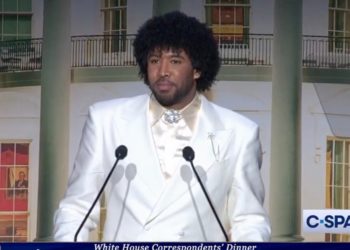THE GOLDEN HOUR: A Story of Family and Power in Hollywood, by Matthew Specktor
The French have l’heure bleue, that introspective, melancholy period of twilight invoked across multiple genres of literature. Hollywood prefers the golden hour, after which Matthew Specktor has titled his rich, atmospheric second memoir. Gold as in money; gold as in sunshine — and, increasingly, gold as in old.
Specktor’s father, Fred, has been dubbed “Hollywood’s oldest super agent.” Now in his early 90s, he represents Morgan Freeman and Danny DeVito at Creative Artists Agency. And now — in a gift better than a gold watch — he has been cast by his son as a major character: a Willy Loman with a happy ending, survivor of a punishing and quintessentially American business whose glory days are demonstrably on the wane.
In his first memoir, “Always Crashing in the Same Car” (2021), Specktor, who is also a novelist and somewhat ambivalent screenwriter, interspersed stories of his divorce and career angst with those of others, like F. Scott Fitzgerald and Tuesday Weld, who’d struggled in La La Land.
Here, too, he departs from the standard confessional format, slipping into the POV of not only his sensitive, persistent dad but, among others, Lew Wasserman, the fearsome mogul for whom Fred started as a gofer; Michael Ovitz, the co-founder of CAA who so dramatically departed for a short-lived stint at Disney; the author James Baldwin (Matthew’s teacher at Hampshire College); and — a little more iffily — Mohamed Atta, the 9/11 terrorist who, in a fictional reimagining that borrows from Jarret Kobek’s novel “Atta,” recoils at a screening of Disney’s “The Jungle Book” when he is a student in Hamburg, deeming it “chaos, chaos, chaos.”
The American dream, assumed to be universal like the name of its oldest studio, was not always a welcome export, we’re meant to understand. “Young people and young industries, and, let’s face it, young nations, too,” Specktor writes with palpable middle-aged rue. “All of them think the world they have conquered is going to stay conquered, that what’s theirs will remain theirs forever.”
Raised in Santa Monica when it was “nowhere, a sleepy backwater filled with nursing homes and dingbat apartments,” he recalls being told by David Lynch that he was “born lucky,” getting inadvertently mooned by a tattooed Bruce Dern and listening over and over to a late-career Marlon Brando’s phone message about “peckin’ at tranquilizers like a goose at corn.”
Having witnessed the movie business in a “period of imperial decline,” Specktor wants to mark out a fertile series of chapters from 1956 to around 2008 (when the iPhone era begins) and acknowledge the people Hollywood failed, or who failed it.
One of the latter was his mother, Katherine McGaffey, an aspiring novelist whose screenwriting career was permanently damaged after she touched up a script in the family’s cabana during the 1981 Writers Guild strike (the union was fighting — how quaint this now seems — over residuals on VHS and Betamax cassettes). They bond over Thomas Hardy and T.S. Eliot, about his becoming a real artist rather than a salesman like his father.
She also has a serious drinking problem. “My mother is a wonderful parent,” Specktor writes, “adept at every part of it except actual parenting.”
At 10, he’s portioning and popping quaaludes sold to him by a neighborhood kid in a Pendleton shirt. At 13, when his parents are fighting, he pulls out the bong hidden under his bed. When news of their split arrives, he snorts a few lines of cocaine chopped with an expired Visa card. At 15, he’s watching “Apocalypse Now” on LSD. Later, his friend Jay Moloney, one of the Young Turks at CAA, will descend into full-blown addiction and hang himself.
But druggie excess is not the main theme of “The Golden Hour. ”Movies, “that great repository of the American self-image,” are the ultimate opiate. The book is about the quiet grind of deal-making, the false starts and phone calls, the hope and disillusionment, the nepo babies and naifs, the fragile egos and executive feints. “Are you stupid? Are you a moron? Have I hired an imbecile?” Wasserman yells at the neophyte Fred Specktor after he leaves a script on Gregory Peck’s stoop rather than in the actor’s hands.
Decades later, almost identical invective pours from the mouth of Scott Rudin, infuriated after a manuscript goes to a competitor. “Are you stupid? How did you miss this?” he lambastes another friend of Matthew’s. “You total moron. You idiot. You imbecile.”
Specktor senior, meanwhile, holds back: “This man who is at once all surface and all depth,” his son writes, “whose hidden interiors I will never know, whose history I have quarried meticulously until I can almost understand him but fall short.”
“The Golden Hour” has an appropriately retro, hard-boiled texture, as if John Lahr’s biography of his own father, Bert, “Notes on a Cowardly Lion,” were sprinkled into one of Norman Mailer’s nonfiction novels. It assumes that life and the movies are in a state of permanent overlap. In this it may already be outdated, and yet, like a long rattling drive down Sunset Boulevard, it both lulls and arouses.
THE GOLDEN HOUR: A Story of Family and Power in Hollywood | By Matthew Specktor | Ecco | 384 pp. | $32
Alexandra Jacobs is a Times book critic and occasional features writer. She joined The Times in 2010.
The post The Son of a Superagent Finds His Way in a Tarnished Hollywood appeared first on New York Times.




